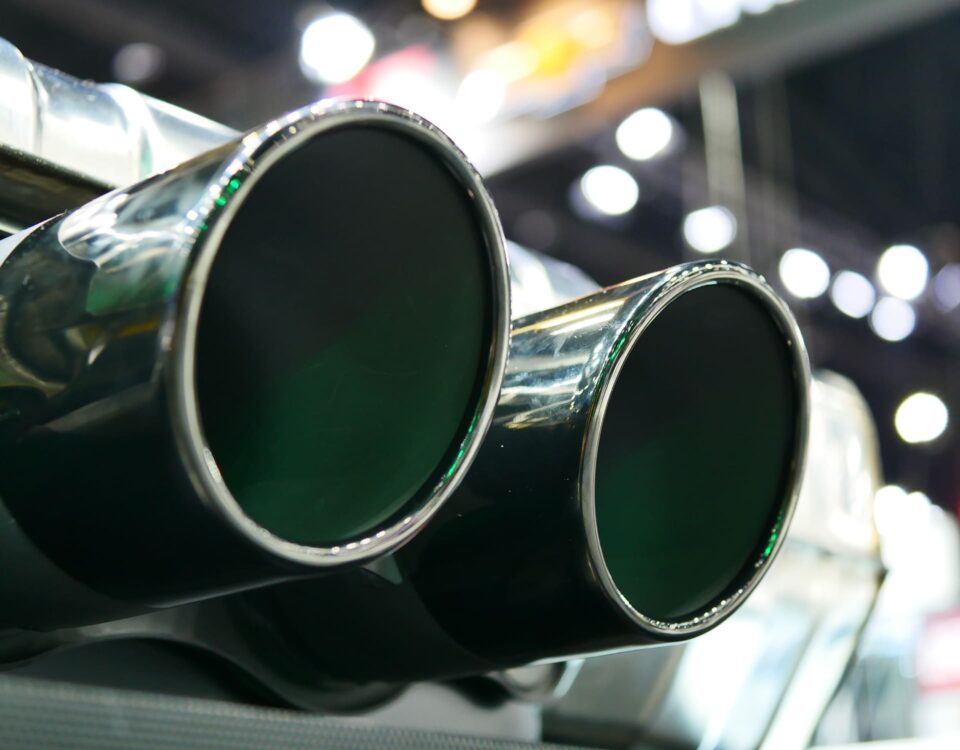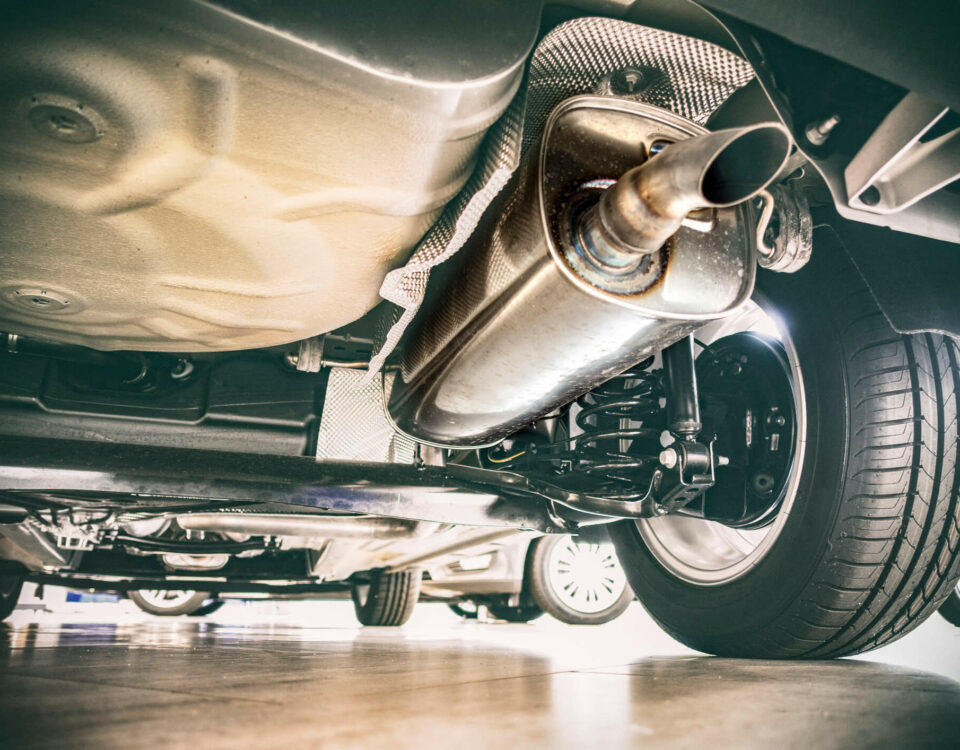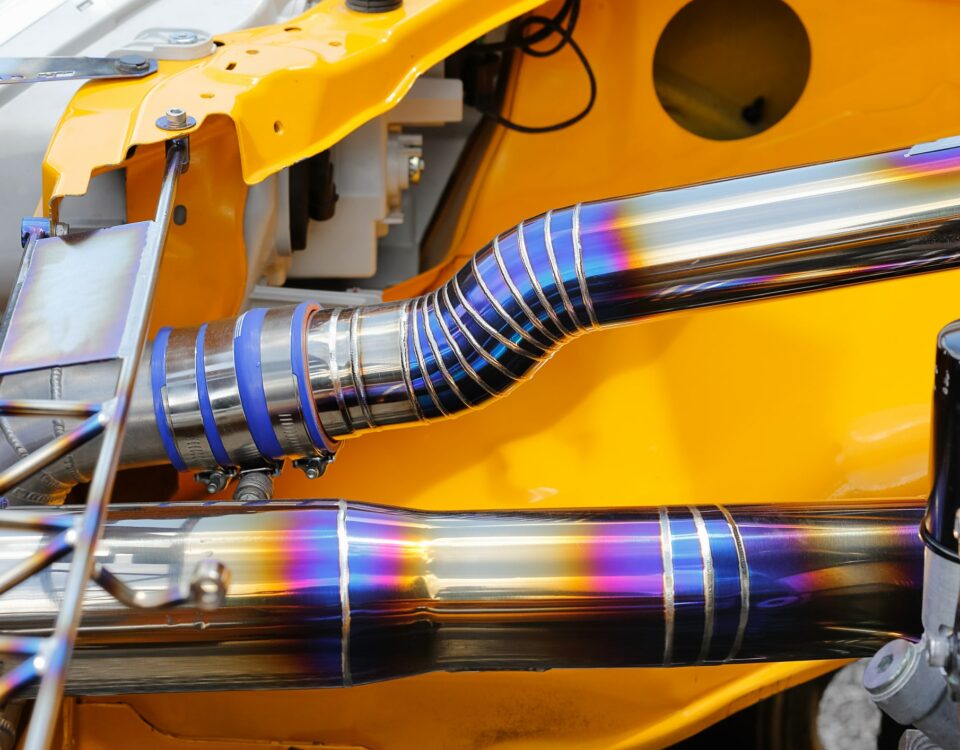How Does The Exhaust System Affect Engine Performance?
Your car’s exhaust system is much more than a collection of pipes designed to expel engine fumes – it is essential for your vehicle’s performance.
A faulty or damaged exhaust system can limit your speed and power, reduce fuel efficiency or even lead to serious mechanical issues if left untreated. However, not many drivers understand how the exhaust system affects engine performance, so we’ve written this guide to help you understand the link between your engine bay and tailpipe.
Mechanically speaking, your engine mainly works as an air pump, drawing fresh air into the combustion chambers and venting the exhaust gases out of the exhaust. Therefore, a well-maintained exhaust system is vital for an efficient engine, and performance exhaust systems can enhance engine performance by improving your car’s ability to cycle air for combustion.
What is an Exhaust System?

Before we get ahead of ourselves, it’s important to have a solid grasp of the basics and a clear definition of what exactly comprises an exhaust system. This complex system of pipes, valves and devices serves four essential functions: collecting gases from the engine, removing toxins, reducing engine noise, and discharging these gases away from the car occupants.
A typical exhaust system consists of four main parts (also known as units) connected by metal tubes – the exhaust manifold, the catalytic converter, the silencer and the tailpipes. Even high-end performance exhaust systems include these parts, which are explained in greater detail below:
1. Exhaust Manifold (AKA the Exhaust Header)
This is the beginning of the exhaust system and connects to the vehicle engine to catch the gases created by burning fuel in the combustion chambers. From here, the exhaust gases are transported to the rest of the exhaust system.
2. Catalytic Converter/DPF
Most modern cars are fitted with catalytic converters or Diesel Particulate Filters (DPFs) which contain rare metals like palladium, rhodium and platinum and use chemical reactions to remove toxic substances. These components can remove up to 90% of toxins like hydrocarbons, carbon monoxide and nitrogen oxide from your exhaust gases, reducing the harm caused by exhaust gases.
3. Silencer or Muffler
The muffler is an oval or cylinder-shaped part attached to your exhaust pipe(s) designed to reduce the noise from your car engine and must comply with noise regulations in the UK. Most mufflers contain a series of tubes designed to reflect soundwaves (some models use insulating materials like fibreglass), but they can sometimes produce backpressure and impact your vehicle’s performance.
4. Tailpipes
Last but not least, the exhaust gases flow out of your car’s tailpipes after they have been filtered and quietened by the other parts of your exhaust system. Tailpipes come in a variety of shapes and sizes, and many people choose to modify them with aftermarket parts, though some mods (especially ones that increase the noise of your car) are technically illegal.
How does an Exhaust System Work?
By using the pressure generated by your engine, the resulting gases and unwanted particles (soot, ash, etc.) are propelled into the exhaust system and ultimately out of the vehicle. As these gases are diverted out of the engine block, they are pushed through filters and pipes designed to reduce the noise and pollutant levels of the waste gases to comply with legal requirements.
Essentially, exhaust systems work by collecting waste products from the combustion process, using the pressure generated to push them through a series of pipes and safely out of the vehicle. But before these gases are unleashed on the outside world, they are pushed through filters and mufflers to make them much safer and quieter.
What are the Effects of a Faulty Exhaust?
A faulty exhaust system can affect your vehicle’s performance in various ways, such as limiting engine performance and reducing fuel efficiency. Although the effects will vary depending on the nature of the problem, a faulty exhaust will commonly cause:
Loud Noises
Leaky or cracked exhaust systems often cause loud mechanical noises – like clunks, hissing or repetitive taps – while you drive, so keep an ear out for unusual sounds.
Reduced Fuel Economy
Over time, your exhaust will get blocked with soot and grime, reducing airflow in your engine and making the combustion process less efficient, lowering your engine power and efficiency.
Higher Emissions
A faulty exhaust system will not be able to effectively filter the exhaust gases from your car, leading to higher concentrations of harmful gases and particulates in your exhaust.
Damage to Other Car Parts
If your exhaust is cracked or leaky, the hot gas from your engine manifold can damage car parts near your exhaust system, potentially leading to serious mechanical issues.
Leaking Fumes into the Cabin
A leaky exhaust system can also leak toxic gases like carbon monoxide into your car’s cabin, causing headaches, dizziness and chronic illnesses in severe circumstances.
MOT Failure/Increased Repair Costs
A faulty or broken exhaust system will cause you to fail your MOT and make you pay for repairs before you can (legally) drive again, so save yourself time and money by regularly servicing and maintaining your exhaust system.
What can Cause an Exhaust System to Break?
Your exhaust system is especially vulnerable to wear and tear, as it is subjected to high temperatures and the outside elements every time you drive. Furthermore, rain and grit will cause the metal of your exhaust pipes to corrode and rust, which can cause parts of your exhaust system to grow holes or even come loose from the vehicle.
However, the most common cause of exhaust system issues is the dirt and residue from your exhaust gases that builds up in your exhaust system, restricting airflow and, in severe cases, causing moving parts to stick together. This issue is especially prevalent in diesel vehicles that feature filters in their exhaust systems (Diesel Particulate Filters or DPFs), as they are prone to blockages unless properly maintained.
Benefits of Performance Exhaust Systems
Installing an aftermarket exhaust system can improve the performance of your car, offering increased power by improving airflow and lowering back pressure in your engine. Installing a performance exhaust system in your car can provide some surprising benefits, such as:
Improved Sound
Many exhaust system modifications are designed to improve the sound and volume of vehicles by installing new tailpipes or larger exhaust pipes to create a louder, more powerful sound. However, modifications to improve the sound of your exhaust may break the laws on sound limits on cars in the UK, especially ‘silencer delete’ or ‘straight pipe’ mods which remove mandated parts from your exhaust system,
Increased Horsepower
While performance exhaust systems won’t boost your vehicle’s performance as a turbo or supercharger will, they can increase horsepower by reducing back pressure in your engine. While back pressure is necessary for your engine to function, reducing it and improving airflow through your exhaust helps your engine work harder and more efficiently.
Improved Fuel Economy
Adding aftermarket exhaust systems can improve your vehicle’s fuel efficiency by increasing airflow to the engine and allowing the fuel to burn more cleanly. Again, modifying your exhaust may not make a world of difference (many drivers report their fuel efficiency improving by 1-2%), but it’s one more reason to consider modding your exhaust.



